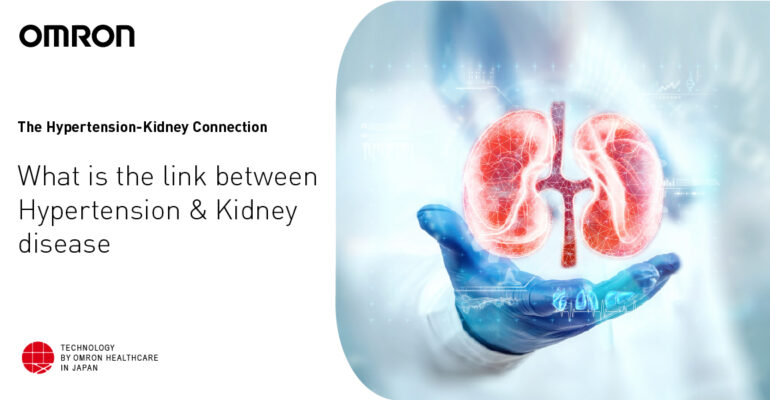What is the link between hypertension and kidney disease?
February 25, 2023 2023-10-06 10:16What is the link between hypertension and kidney disease?

What is the link between hypertension and kidney disease?
Hypertension, also known as high blood pressure, is a common health condition that affects millions of people worldwide. It is a major risk factor for heart disease, stroke, and other cardiovascular diseases. However, hypertension can also have a significant impact on kidney health. In this blog, we will explore the link between hypertension and kidney disease.
What is Blood pressure?
Blood pressure is the force of blood against the walls of the arteries. When the force is too high, it can cause damage to the arteries, leading to serious health complications. Hypertension is diagnosed when blood pressure consistently measures 140/90 mmHg or higher.[1]
What is kidney disease?
Kidney disease, also known as renal disease, refers to damage or disease of the kidneys that impairs their ability to function properly. The kidneys are responsible for filtering waste products from the blood and regulating fluid and electrolyte balance. Kidney disease can lead to a buildup of toxins in the body, fluid overload, and electrolyte imbalances.[2]
How are Hypertension and Kidney Disease Related?
Hypertension and kidney disease are closely related. High blood pressure can damage the blood vessels in the kidneys, leading to reduced blood flow and impairing their ability to function properly. Over time, this damage can lead to chronic kidney disease (CKD), a progressive condition in which the kidneys gradually lose function. CKD can eventually lead to kidney failure, a serious and potentially life-threatening condition.[3]
According to studies, the prevalence of hypertension and chronic kidney disease (CKD) is high in India. [4] In a study conducted in India, the prevalence of CKD was found to be 17.2%, with 43.1% of the cohort having hypertension. Another study found that hypertension was noted in 64.5% of the CKD group in India. [5] In the Indian Chronic Kidney Disease (ICKD) study, about 87% of the participants were hypertensive. Worldwide, hypertension is a leading cause of kidney disease and kidney failure. [6] High blood pressure is the second most common cause of kidney failure, causing 29% of new cases.[7]
The Link Between High Blood Pressure and Chronic Kidney Disease
Chronic kidney disease is a major complication of hypertension. The damage caused by high blood pressure to the blood vessels in the kidneys can cause scarring and thickening of the small blood vessels in the kidneys, making it harder for the kidneys to filter waste products from the blood. This can lead to a buildup of toxins in the body and ultimately lead to kidney failure. [8]
The Link Between Hypertension and Other Kidney Conditions:
Hypertension is also a major risk factor for the development of other kidney conditions, including:
- Polycystic kidney disease: A genetic condition in which cysts form in the kidneys, causing them to enlarge and lose function.
- Kidney stones: Hard deposits that form in the kidneys and can cause pain and blockages in the urinary tract.
- Glomerulonephritis: Inflammation of the glomeruli, the tiny filters in the kidneys that remove waste and excess fluids from the blood.
- Pyelonephritis: A bacterial infection of the kidneys that can cause damage and scarring if left untreated. [9] [10]
Preventing Hypertension-Related Kidney Disease:
By taking proactive steps to manage hypertension, Individuals can reduce their risk of kidney disease and improve their overall health and well-being. There are steps that individuals can take to prevent hypertension-related kidney disease. [11]
- Manage blood pressure: The most important step in preventing hypertension-related kidney disease is to manage blood pressure levels. This can be achieved through lifestyle changes such as eating a healthy diet, exercising regularly, reducing stress, and limiting alcohol and caffeine consumption. In some cases, medication may be necessary to lower blood pressure.
- Control blood sugar levels: Individuals with diabetes are at an increased risk for hypertension-related kidney disease. It is important to work with a healthcare provider to manage blood sugar levels and prevent complications such as kidney disease.
- Quit smoking: Smoking can increase blood pressure and damage blood vessels, increasing the risk of hypertension-related kidney disease. Quitting smoking is an important step in preventing kidney disease.
- Monitor kidney function: Regular monitoring of kidney function through blood and urine tests can help detect early signs of kidney damage and prevent further damage from occurring.
- Maintain a healthy weight: Being overweight or obese can increase the risk of hypertension-related kidney disease. Maintaining a healthy weight through a balanced diet and regular exercise can help reduce this risk.
- Monitor blood pressure: It is important to monitor blood pressure regularly and work with a healthcare provider to develop a personalized plan for managing hypertension and reducing the risk of kidney disease. Using a reliable and accurate blood pressure monitor, such as the Omron BP monitor, can make it easier for individuals to monitor their blood pressure at home.
Wrap-up
Hypertension-related kidney disease is a serious health concern that can lead to kidney failure if left untreated. By taking steps to prevent and manage hypertension-related kidney disease, individuals can maintain optimal kidney health and reduce the risk of serious health complications.
Reference:
- https://www.mayoclinic.org/diseases-conditions/high-blood-pressure/diagnosis-treatment/drc-20373417
- https://medlineplus.gov/kidneydiseases.html
- https://my.clevelandclinic.org/podcasts/love-your-heart/the-relationship-between-blood-pressure-and-kidneys
- https://www.ncbi.nlm.nih.gov/pmc/articles/PMC4446915/
- https://clinmedjournals.org/articles/jcnrc/journal-of-clinical-nephrology-and-renal-care-jcnrc-6-061.pdf
- https://academic.oup.com/ckj/article/15/1/60/6352495
- https://www.kidneyfund.org/all-about-kidneys/quick-kidney-disease-facts-and-stats#:~:text=High%20blood%20pressure%20is%20the,12.4%25).
- https://www.ahajournals.org/cgi/doi/10.1161/HYPERTENSIONAHA.110.150722
- https://www.kidneyfund.org/all-about-kidneys/types-kidney-diseases
- https://www.niddk.nih.gov/health-information/kidney-disease/high-blood-pressure
- https://www.niddk.nih.gov/health-information/kidney-disease/high-blood-pressure






